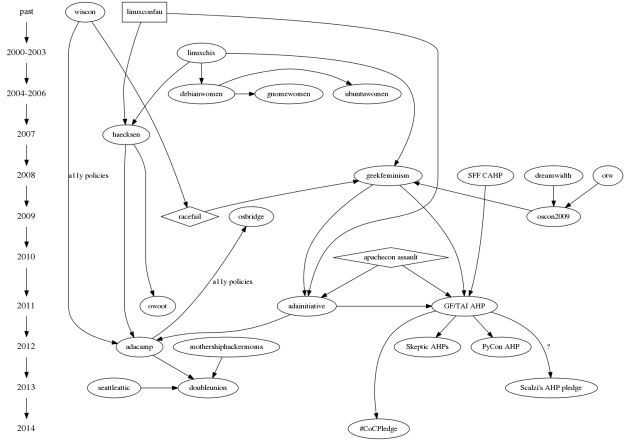This article originally appeared on Geek Feminism.
Last week, Geek Feminism announced we’ve adopted a Code of Conduct.
As Annalee said in that announcement, this comes long after adoption of codes in other communities, especially events:
You’ve been promoting Codes of Conduct for years. Why didn’t you adopt one of your own sooner?
We dropped the ball in a big way here. We’ve known for at least two years that we needed a Code of Conduct internally. We’re sorry for the inexcusable delay.
We thought it would be useful to other communities to discuss how this happened.
Timeline
May 2008: Skud founded the Geek Feminism wiki, two and a half years before anti-harassment policies and codes of conduct began to be promoted by geek feminists.
August 2009: Skud founded the Geek Feminism blog, more than one year before anti-harassment policies and codes of conduct began to be promoted by geek feminists. At the time of launch. the blog had a strong comment policy which remains in essentially the same form (albeit expanded since). We weren’t the first by a long way to have such a policy (in fact it was based fairly closely on that of Hoyden About Town) but this was at the time unusual among the technical blogs and forums that many of the original bloggers frequented.
November 2010: Warning for assault Nóirín Plunkett was assaulted at ApacheCon. Within the month, Valerie Aurora had released a draft anti-harassment policy for events and finalised it for events to adopt. This is the policy that is now maintained on the wiki.
I have not found any discussion of Geek Feminism adopting such a policy internally at this time, which isn’t surprising considering it was envisaged as being for in-person events.
Early 2011: there were person-to-person complaints within the Geek Feminism community that an individual within it is harassing people when Geek Feminism contributors meet up in person (as sometimes happens at conferences we attend and similar).
January 2012: AdaCamp Melbourne (the first event I know of run by Geek Feminism community members that occurred after the development of the event anti-harassment policy) has an anti-harassment policy.
July 2012: Blogger Nice Girl reported harassment at OSCON by attendees identifying as geek feminists and using terminology from our wiki. (We do not know the identities of these people.) In August, Skud wrote on the blog:
We are taking a few different steps to address the specific concerns raised. One is that we are reviewing our wiki pages to make sure that we have information on slut-shaming and that it is appropriately cross-linked with articles about sexualised environments at geek events to help reinforce/educate people that criticising an individual woman’s choice of clothing is very different from criticising (for instance) a business that uses booth babes as a marketing device.
The second thing is that we are setting up a process so that people can contact us if they experience harassment by someone associated with GF. This is a work in progress, especially since GF is (as mentioned) a loose affiliation with no official membership, and because we may be asked to deal with harassment that occurs outside our own spaces. However, if someone is harassing another person under GF’s name or in a way associated with GF, then we want to provide a private way for people to contact us, and respond appropriately.
On the same day, Skud wrote the first version of the wiki’s Slut shaming page.
At around this time, Skud founded Growstuff, reducing her available volunteer time; her participation in the blog and other Geek Feminism activities dropped drastically over the next few months.
July/August 2012: Emails about the harassment by a Geek Feminism member discussed earlier began to circulate among Geek Feminism bloggers, presumably with our awareness of internal harassment risks heightened by the public and private discussions of Nice Girl’s reports. More than one person reported feeling unsafe and no longer recommending our backchannels as safe spaces. Skud first became aware of these reports at this time.
Given the seriousness of a known harasser operating in a community central to anti-harassment policy promotion, it didn’t seem appropriate to wait for a policy and response group as mooted by Skud to be in place and instead Valerie Aurora spearheaded a letter asking this person to leave the community, which was signed by several others including myself. The person left our community.
After this, I cannot find any further internal discussion of an anti-harassment policy for approximately another year.
April 2013: Recognising her lack of availability for volunteering due to work commitments, Skud formally announced she was stepping down as a Geek Feminism administrator. There was a discussion about handing over various technical responsibilities but not (that I can find) about the anti-harassment status.
July 2013: I sent an email to the blogger backchannel reminding them that an anti-harassment policy is still to be developed. There was a short and inconclusive discussion.
October 2013: Annalee produced an early draft policy document with many unresolved questions, particularly who the policy was intended to apply to, and how reports would be resolved. Comments on the document were made by several community members.
November 2013: Rick Scott began to formalise existing editorial practice on the wiki in the Editorial guidelines page, which was revised over a few months by a small group of wiki editors. It is intended more to communicate norms to newcomers and onlookers than to protect wiki editors from each other.
January 2014: Discussion had died down on Annalee’s draft. I sent an email with some open questions but no one including myself follows up before May.
May 2014: Annalee produced a new draft anti-harassment policy and circulated it for discussion. Skud, Tim, Valerie and myself all commented and edited substantially. Annalee asked for consensus on adopting it, Valerie suggests she JFDI, and I ended up proposing a timeline through to late June for circulating it more widely, giving people time to familiarise themselves, appointing the Anti-Abuse team, and then making the document public.
June 2014: The Anti-Abuse Team was appointed after an internal feedback process. Annalee announced our Code of Conduct publicly. I made our policy made available for reuse and promoted adoption by other communities.
Post mortem
Things we did right
Skud established best practices (particularly the comment policy) at the time our community was founded.
When it became clear that harassment in our community was a periodic problem, we acknowledged publicly that we had not put best practices into place (a anti-harassment policy) and began discussing one suitable to our community.
We returned to the issue periodically without further external prompting or known (to me) incidents of harassment and eventually got a policy in place. In the process, we hope we have developed a new best-practice policy for communities to use so that others do not have to go through this process.
Our new policy has a pretty sophisticated description of various types of harassment, based on a wide variety of personal experiences and reports of harassment received by those of us who do anti-harassment action or advising in other communities. It is better adapted for a long-lived community than the event policy is, by, eg, considering incidents of harassment in the past and in other communities. It has a more explicitly feminist stance in, eg, stating that it centres the concerns of marginalised people, and that tone-policing will not be regarded as harassment.
Things we did wrong
Various individual members of the community were slow to recognise harassment in our community based on first-hand reports from victims.
We were very slow at responding to the known need for a policy, especially for a group which was among the leaders in advocating that in-person events adopt policies. Even on the most generous reading of this timeline, there was explicit discussion of an internal anti-harassment policy in August 2012, at the time Skud discussed Nice Girl’s harassment, meaning that nearly two years passed between us explicitly committing to it existing and it being put in place. We seem to have been caught in a common problem here: we had no active need for the policy (that I know of personally), and so we did not push ahead with it.
Less central members of our community report that they wondered why we didn’t have a code of conduct, but did not feel empowered to ask about it.
Where to from here?
It is far better to have clear documentation concerning safety in particular, and common problems in general, before they are needed. We hope our reusable policy gets adopted by other communities or assists them in drafting their own, to avoid some of the slowness involved in starting from scratch.
Skud reviewed our community structure and documentation in the lead-up to her Open Source Bridge talk and found various inadequacies. She and Annalee have each raised the issue of reviewing our community’s processes,. We would need to look at questions such as:
- are we following best practices in anti-harassment, anti-abuse and establishing safer spaces?
- is our group unusually reliant on certain individuals and if so (it usually is so in any community), how can we share knowledge and resources so that there are less single points of failure?
- is our documentation sufficient for a newcomer to the community?
Does anyone have pointers to similar review processes in other groups? That would be really handy.
Skud suggests that in addition, with important projects like a code of conduct, a relatively structureless group like ours explicitly appoint people to the project, so that they feel empowered to act on it. We particularly need to be alert to Warnock’s dilemma (does silence signify consent, ignorance, lack of understanding, lack of interest or contempt?) in discussing changes to our community. We also need to be alert to hidden hierarchies, to, eg, the sense that nothing can go ahead without approval from, say, Skud as founder or myself as the most frequent poster.
Annalee suggests that we need to improve our institutional memory with documentation like that above, together with internal private documentation where it is impossible to make things public. This helps identify when things were done for a very good reason, versus having emerged essentially by accident, versus never having been done at all by anyone. We also need to clarify (probably continuously) about whether we are a JFDI community, or whether projects must have people appointed to them, or other.
Acknowledgements
Thanks to Annalee, Maco, Skud, Valerie and one of the linkspammers for their review of this post. Except where explicitly attributed, all opinions herein should be taken to be mine, informed by discussion with others in Geek Feminism but not necessarily co-signed by them.

